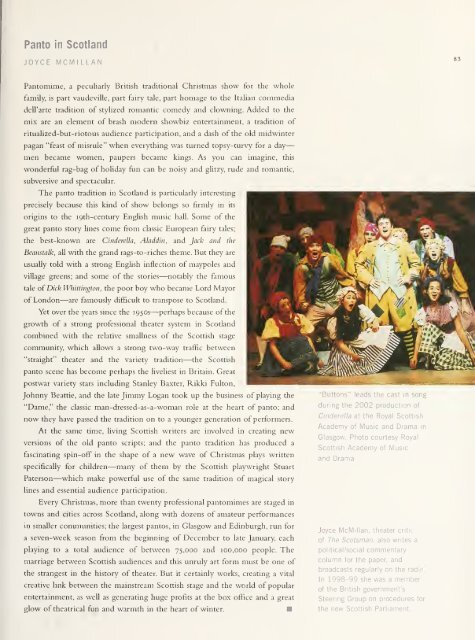SCOTLAND - Smithsonian Digital Repository - Smithsonian Institution
SCOTLAND - Smithsonian Digital Repository - Smithsonian Institution
SCOTLAND - Smithsonian Digital Repository - Smithsonian Institution
You also want an ePaper? Increase the reach of your titles
YUMPU automatically turns print PDFs into web optimized ePapers that Google loves.
—<br />
Panto in Scotland<br />
JOYCE MCMILLAN<br />
83<br />
Pantomime, a peculiarly British traditional Christmas show for the whole<br />
family, is<br />
part vaudeville, part fairy tale, part homage to the Italian commedia<br />
dell'arte tradition of stylized romantic comedy and clowning. Added to the<br />
mix are an element of brash modern showbiz entertainment, a tradition of<br />
ritualized-but-riotous audience participation, and a dash of the old midwinter<br />
pagan "feast of misrule" when everything was turned topsy-turvy for a day<br />
men became women, paupers became kings. As you can imagine, this<br />
wonderful rag-bag of hohday fun can be noisy and glitzy, rude and romantic,<br />
subversive and spectacular.<br />
The panto tradition in Scotland is<br />
particularly interesting<br />
precisely because this kind of show belongs so firmly in its<br />
origins to the 19th-century Enghsh music hall. Some of the<br />
great panto story lines come from classic<br />
European fairy tales;<br />
the best-known are Cinderella, Aladdin, and Jack and the<br />
Beanstalk, all with the grand rags-to-riches theme. But they are<br />
usually told with a strong English inflection of maypoles and<br />
village greens; and some of the stories—notably the famous<br />
tale ofDick Whittington, the poor boy who became Lord Mayor<br />
of London—are famously difficult to transpose to Scotland.<br />
Yet over the years since the 195QS— perhaps because of the<br />
growth of a strong professional theater system in Scotland<br />
combined with the relative smallness of the Scottish stage<br />
community, which allows a strong two-way traffic between<br />
"straight" theater and the variety tradition—the Scottish<br />
panto scene has become perhaps the liveliest in Britain. Great<br />
postwar variety stars<br />
including Stanley Baxter, Rikki Fulton,<br />
Johnny Beattie, and the late Jimmy Logan took up the business of playing the<br />
"Buttons" leads the cast in<br />
song<br />
"Dame," the classic man-dressed-as-a-woman role at the heart of panto; and<br />
now they have passed the tradition on to a younger generation of performers.<br />
At the same time, living Scottish writers are involved in creating new<br />
versions of the old panto scripts; and the panto tradition has produced a<br />
fascinating spin-off in the shape of a new wave of Christmas plays written<br />
specifically for children—many of them by the Scottish playwright Stuart<br />
during the 2002 production of<br />
Cinderella at the Royal Scottish<br />
Acadenny of Music and Drama in<br />
Glasgow. Photo courtesy Royal<br />
Scottish Academy of Music<br />
and Drama<br />
Paterson—which make powerful use of the same tradition of magical story<br />
lines and essential audience participation.<br />
Every Christmas, more than twenty professional pantomimes are staged in<br />
towns and cities<br />
across Scotland, along with dozens of amateur performances<br />
in smaller communities; the largest pantos, in Glasgow and Edinburgh, run for<br />
a seven-week season from the beginning of December to late January, each<br />
playing to a total audience of between 75,000 and 100,000 people. The<br />
marriage betw^een Scottish audiences and this unruly art form must be one of<br />
the strangest in the history of theater. But it<br />
certainly works, creating a vital<br />
creative link between the mainstream Scottish stage and the world of popular<br />
entertainment, as well as generating huge profits at the box office and a great<br />
glow of theatrical fun and warmth in the heart of winter.<br />
Joyce McMillan, theater critic<br />
of The Scotsman, also writes a<br />
political/social commentary<br />
column for the paper, and<br />
broadcasts regularly on the radio.<br />
In<br />
1998-99 she was a member<br />
of the British government's<br />
Steering Group on procedures for<br />
the new Scottish Parliament.
















